15 Hilarious Spanish Puns That Are So Bad They’re Amazing
Today, we’re going to learn about Spanish puns that make no sense in English.
Yes, you read that right. This article is full of funny Spanish jokes that not only make little sense in English, but are just downright bad. So bad… they’re hilarious.
Humour is often hard to translate. This is especially true when the humour comes from wordplay; puns rarely work in more than one language.
Why bother? Well, the fact that Spanish puns are hard to understand is precisely what makes them so useful to learn!
If you don't get the punchline, the solution is to expand your vocabulary until you can spot the double meaning. That's why learning some Spanish puns can improve your Spanish as well as make you laugh.
Well, maybe they won't make you laugh that hard. Most puns are more cringeworthy than laugh-inducing. The Spanish “jokes” below are no exception.
Consider yourself warned!
How to Say “Tell Me a Joke” in Spanish, Spanish Puns, and Jokes
Before we get to the actual jokes, here’s a few handy phrases for getting the ball rolling with jokes:
- “Tell me a joke” in Spanish – Cuéntame un chiste
- “I know a good joke” – Conozco un buen chiste
- “A joke” or “a prank” – una broma
- “A joke” or “a funny story” – un chiste
- “A pun” or “a play on words” – un juego de palabras
And here’s an infographic with all the puns:
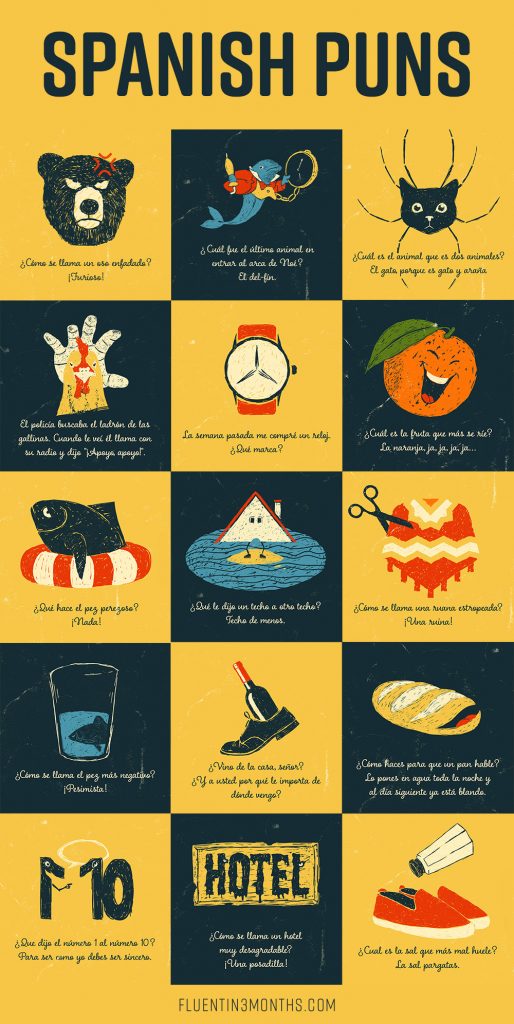
1. The Lazy Fish
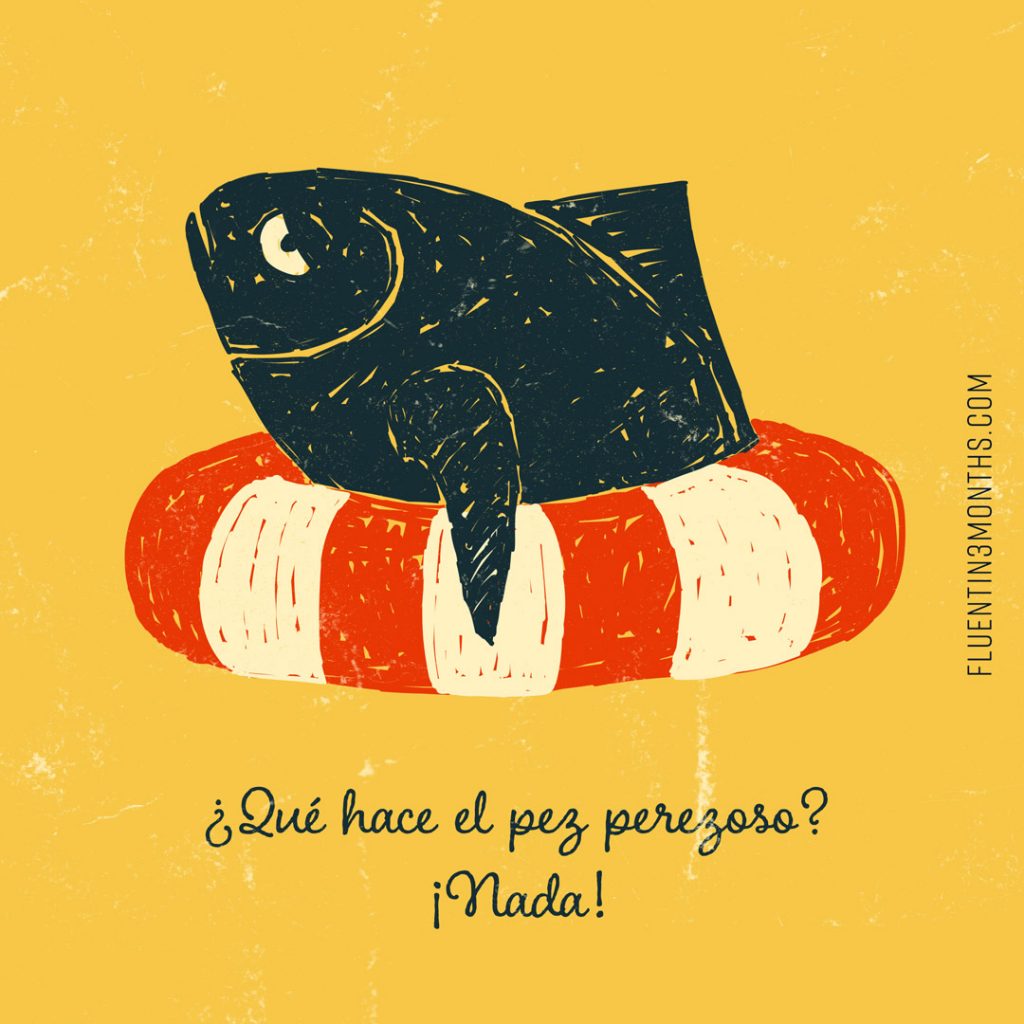
¿Qué hace el pez perezoso? ¡Nada!
Translation:
What does the lazy fish do? Nothing! or He swims!
Nada, in this context, has two meanings: it could mean “nothing”, i.e. the fish does nothing, because he's lazy. However, nada is also the third-person present singular form of the verb nadar, “to swim”.
So a lazy fish does nada! Get it?
2. The Laughing Orange
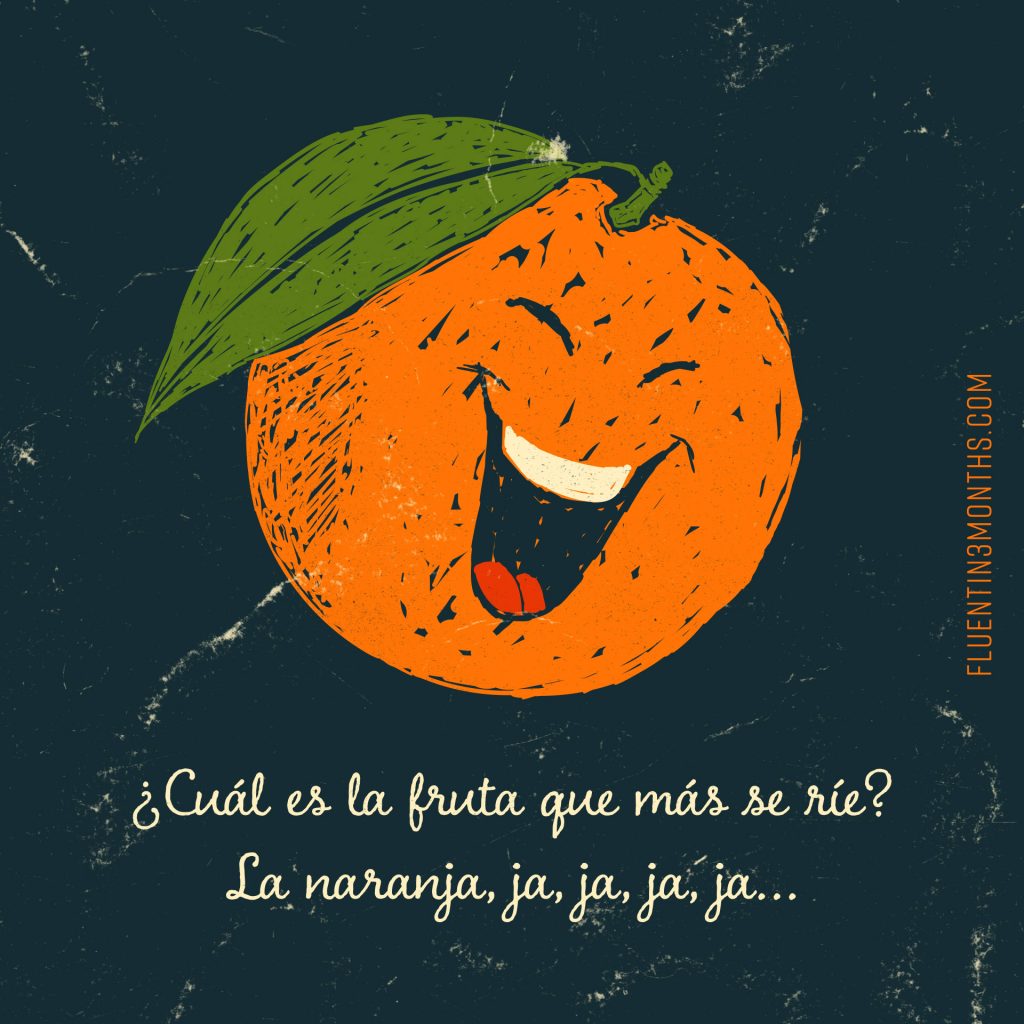
¿Cuál es la fruta que más se ríe? La naranja, ja, ja, ja, ja…
Translation:
Which fruit laughs the most? The orange, ha ha ha ha…
In Spanish, laughter is normally written as “ja ja ja ja”. It's like “ha ha ha ha” in English; the Spanish “j” sounds roughly similar to the English “h”.
The word for “orange” is naranja, which ends with a “ja”. So oranges must laugh a lot, because they have a ja (“ha”) in their name.
3. The Ruined Ruana
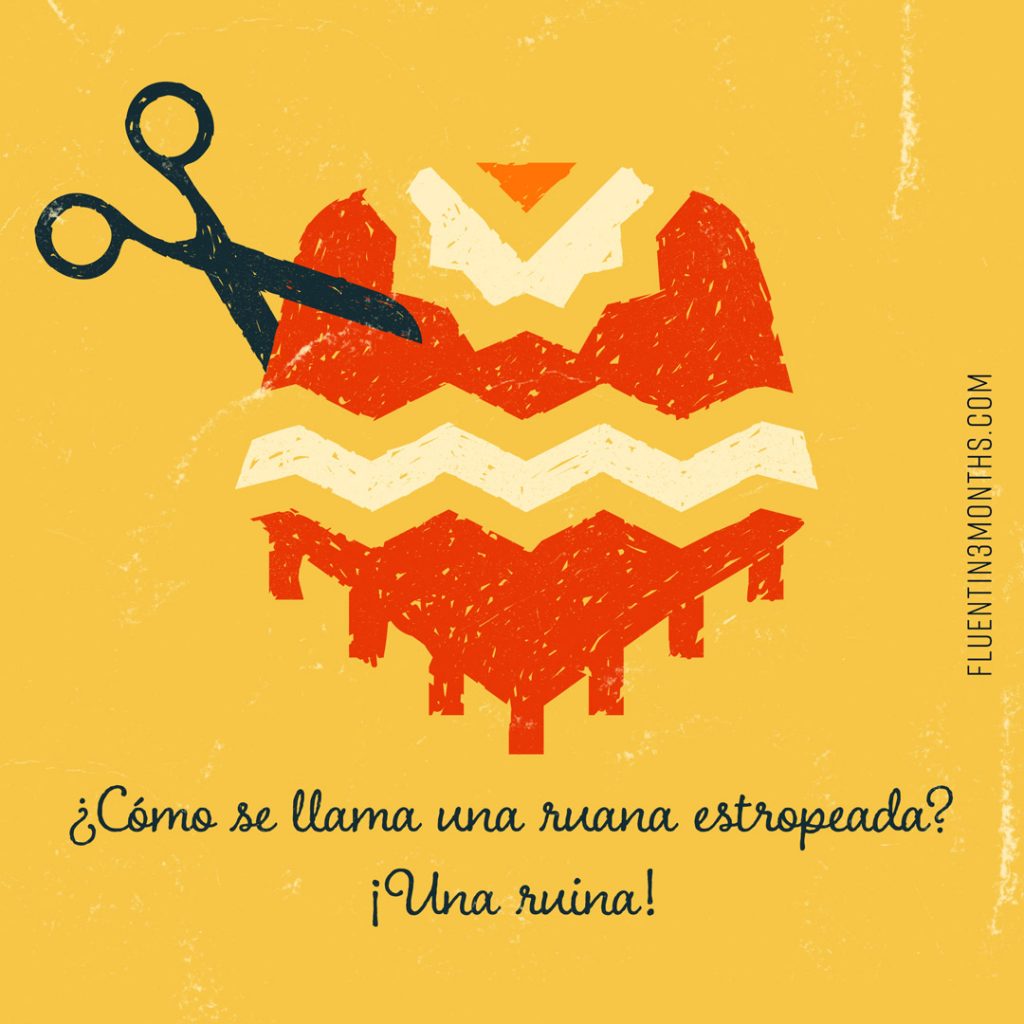
¿Cómo se llama una ruana estropeada? ¡Una ruina!
Translation:
What do you call a ruined/damaged/broken ruana? A ruin!
A ruana is a type of poncho that's worn in some parts of South America. Its name sounds like the word ruina, which means a ruin or a wreck.
So when a ruana is badly damaged, it becomes a ruina. Obviously.
4. The Nightmare Hotel
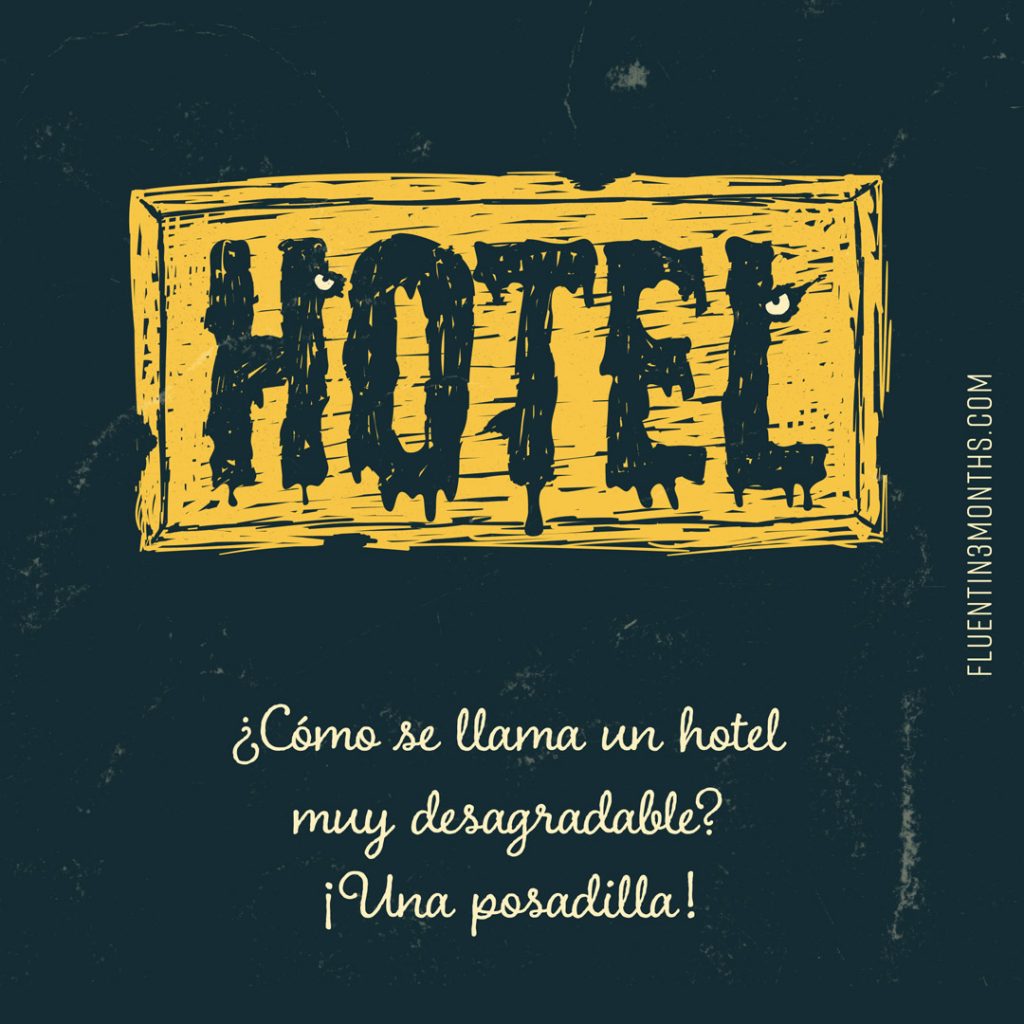
¿Cómo se llama un hotel muy desagradable? ¡Una posadilla!
Translation:
What do you call a very bad hotel? A “posadilla”
Posadilla can't be directly translated because it's not a real word. It's a combination of posada, meaning a hotel or inn and pesadilla, which means “nightmare”.
So a nightmarish posada is a posadilla. Hilarious.
5. The Angry Bear

¿Cómo se llama un oso enfadado? ¡Furioso!
Translation:
What do you call an angry bear? Furious!
I like this one. A bear is an oso (a cognate of the uncommon English word ursine, which means “relating to or resembling bears”), and furious is translated to furioso.
Geddit? A furi-oso!
6. A Pessimistic Fish
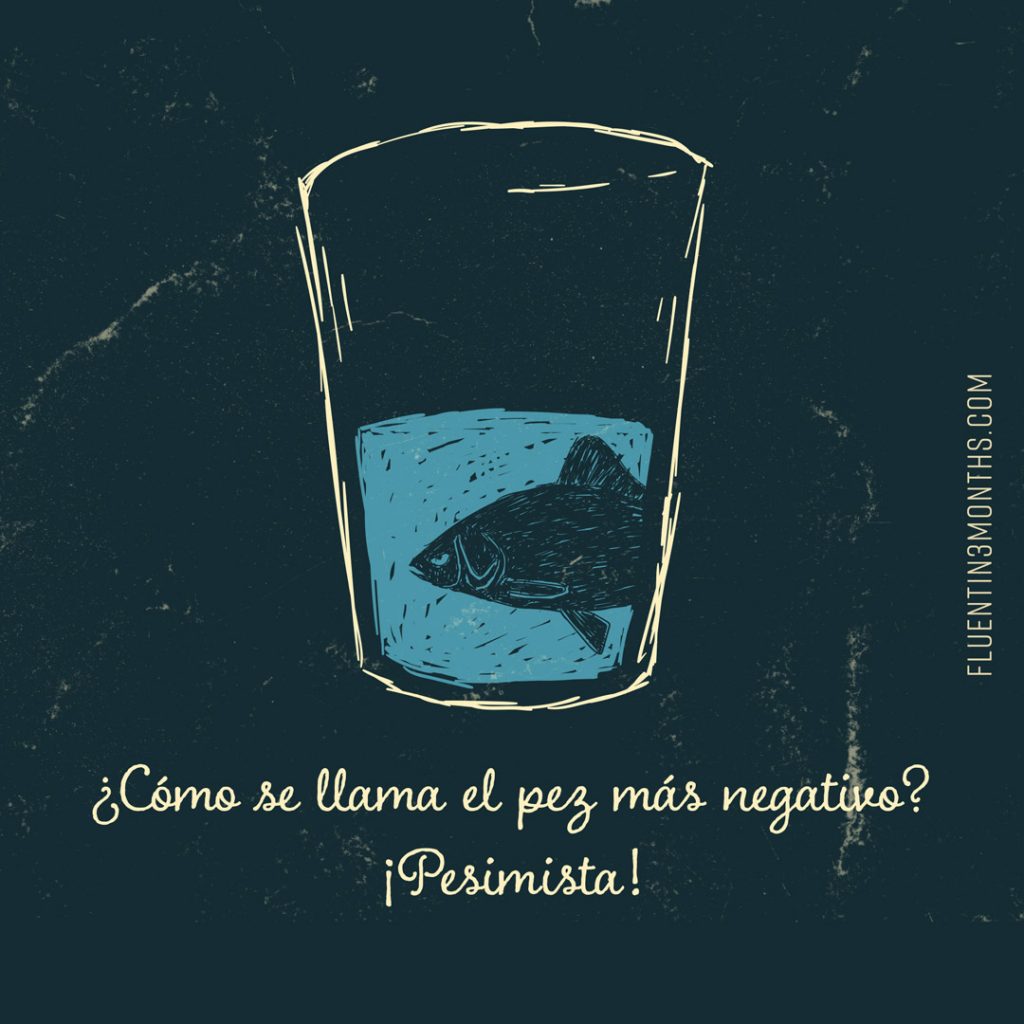
¿Cómo se llama el pez más negativo? ¡Pesimista!
Translation:
What do you call the most negative fish? A pessimist!
Disclaimer: This pun only works in Latin American accents.
This pun comes from the fact that the word pez, “fish”, sounds the same as the first syllable of pesimista, a pessimist.
Because the pez is so negative, he's a pez-imista.
7. The Lonely Roof
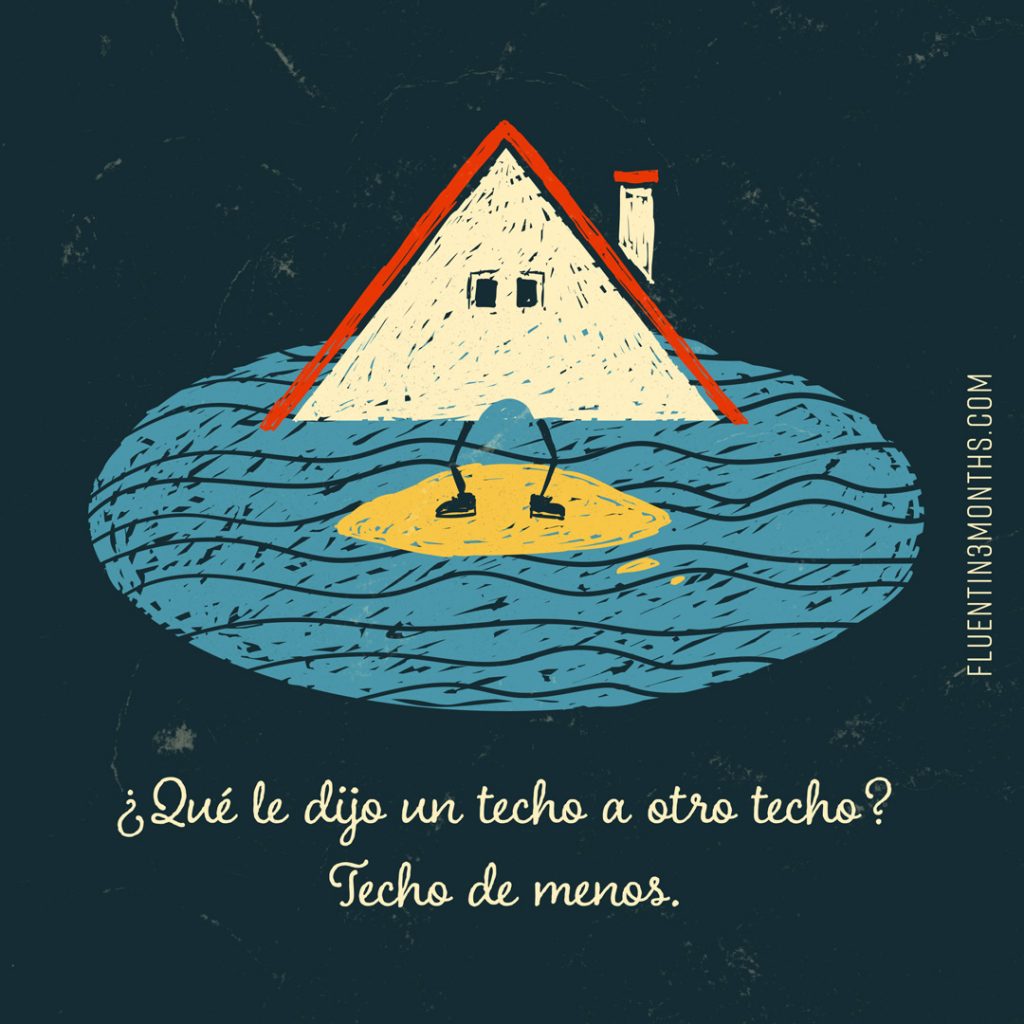
¿Qué le dijo un techo a otro techo? Techo de menos.
Translation:
The first line means “what did one roof say to the other roof?”
The second line has a double meaning. “Te echo de menos” makes no sense if you translate it word-for-word, but it's a common way of saying “I miss you” in Spanish.
The punchline here is that te echo, when said fast, sounds like techo, i.e. “roof”. So it's only natural that a techo would say techo (te echo) de menos!
8. Talkative Bread
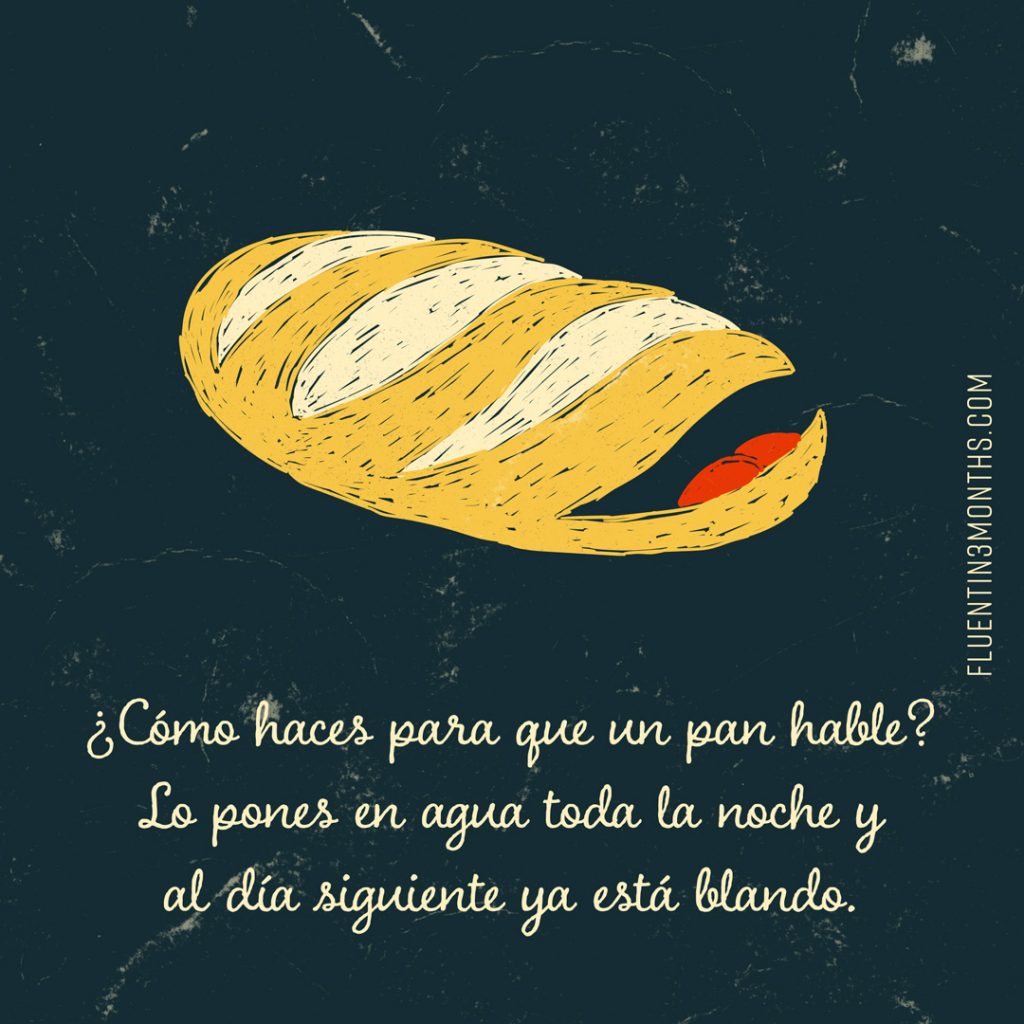
¿Cómo haces para que un pan hable? Lo pones en agua toda la noche y al día siguiente ya está blando.
Translation:
How do you get bread to talk? Put it in water all night, and on the next day it will be soft. or Put it in water all night, and on the next day it will be talking.
The pun here is on está blando, which means “it's soft”, but which sounds like está hablando, i.e. “it's talking.”
So if you soak some bread in water, it will become blando – but it may also be hablando.
9. A Mathematical Pun

¿Que dijo el número 1 al número 10 ? Para ser como yo debes ser sincero.
Translation:
What did the 1 say to the 10? To be like me you have to be sincere.
Sincero, “sincere”, sounds just like sin cero, “without zero”. A one is just a ten without the zero, so if ten becomes a bit more sincero then maybe it will turn into a one.
Here's a similar joke, which plays on the similarity between “vente” (come) and “veinte” (twenty):
¿Que dijo el número 18 al número dos? Vente conmigo!
Translation:
What did the 18 say to the 2? Come with me!
“Come with me!” sounds like “Twenty with me!” in Spanish. And of course eighteen plus two equals twenty.
10. The Last Animal on Noah's ark
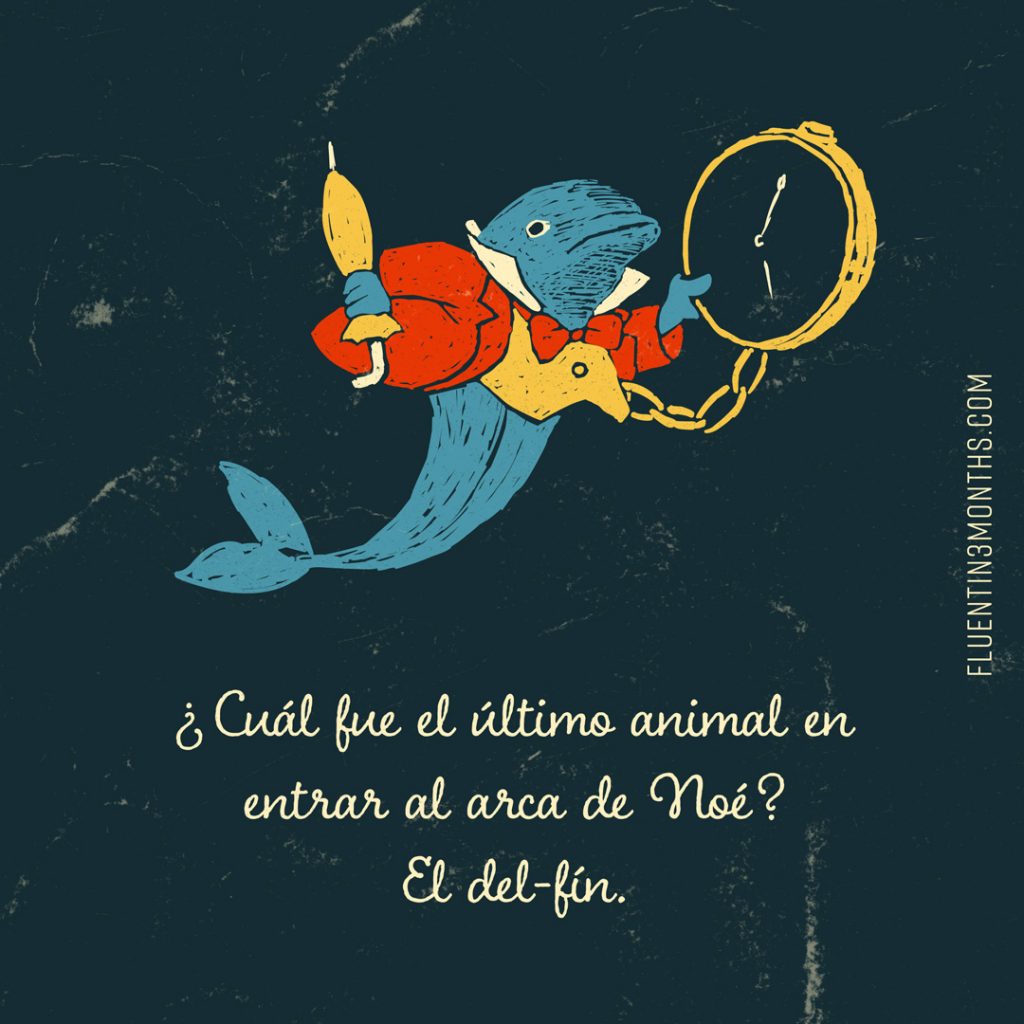
¿Cuál fue el último animal en entrar al arca de Noé? El del-fín.
Translation:
What was the last animal to enter Noah's ark? The dolphin.
“Dolphin” in Spanish is delfín, which sounds just like del fín, meaning “from/of/at the end”.
Because delfines are del fin, they'd obviously be the last animal to get on board.
Although there's an obvious problem with this joke: dolphins can swim, so it's not clear why they'd need to get on Noah's ark in the first place…
11. Arachno-cat
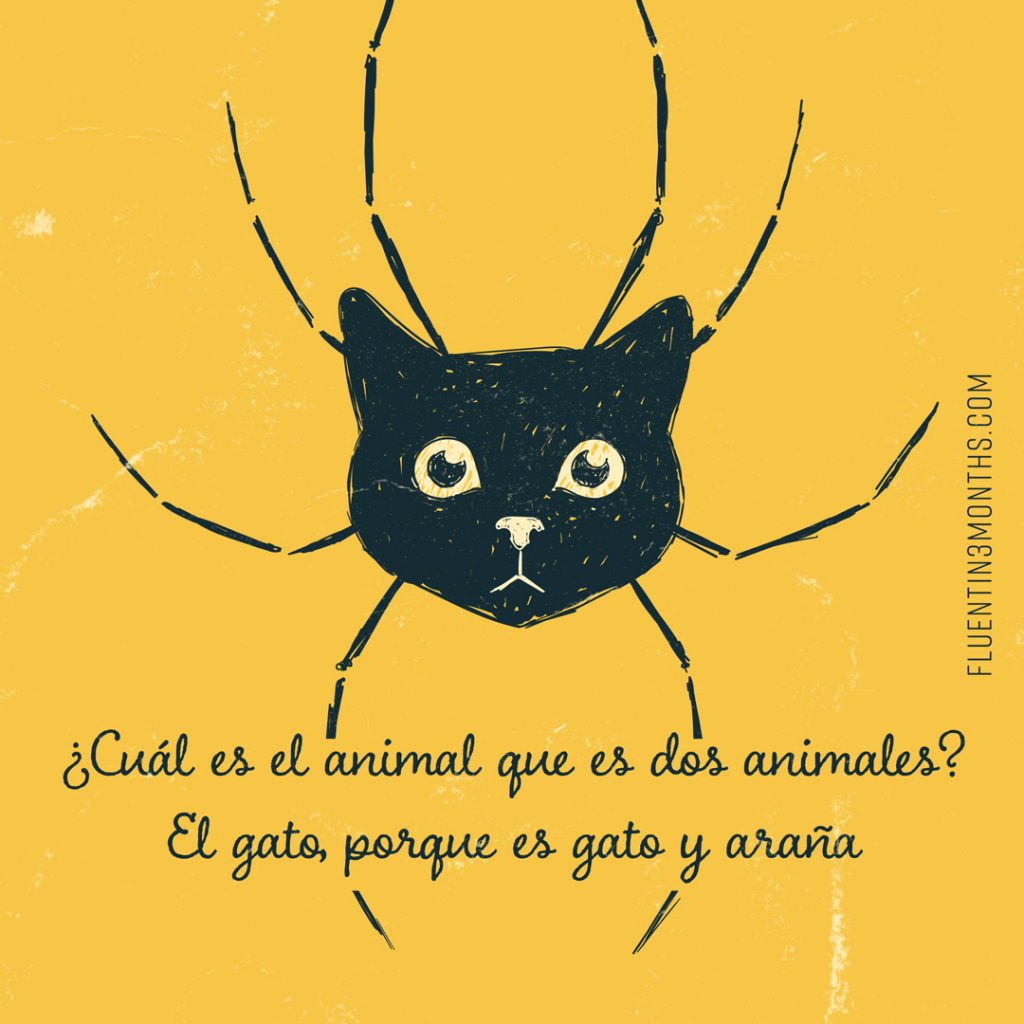
¿Cuál es el animal que es dos animales? El gato, porque es gato y araña
Translation:
What animal is two animals? The cat, because it's a cat and a spider. or The cat, because it's a cat and it scratches.
Araña means spider, but it's also the third-person singular of the verb arañar, which means “to scratch”.
The double meaning is obvious: es gato y araña could mean “it's a cat and it scratches”, but it could also mean “it's a cat and a spider”.
Spanish cats have nine lives, but do they also have eight legs?
12. Help!
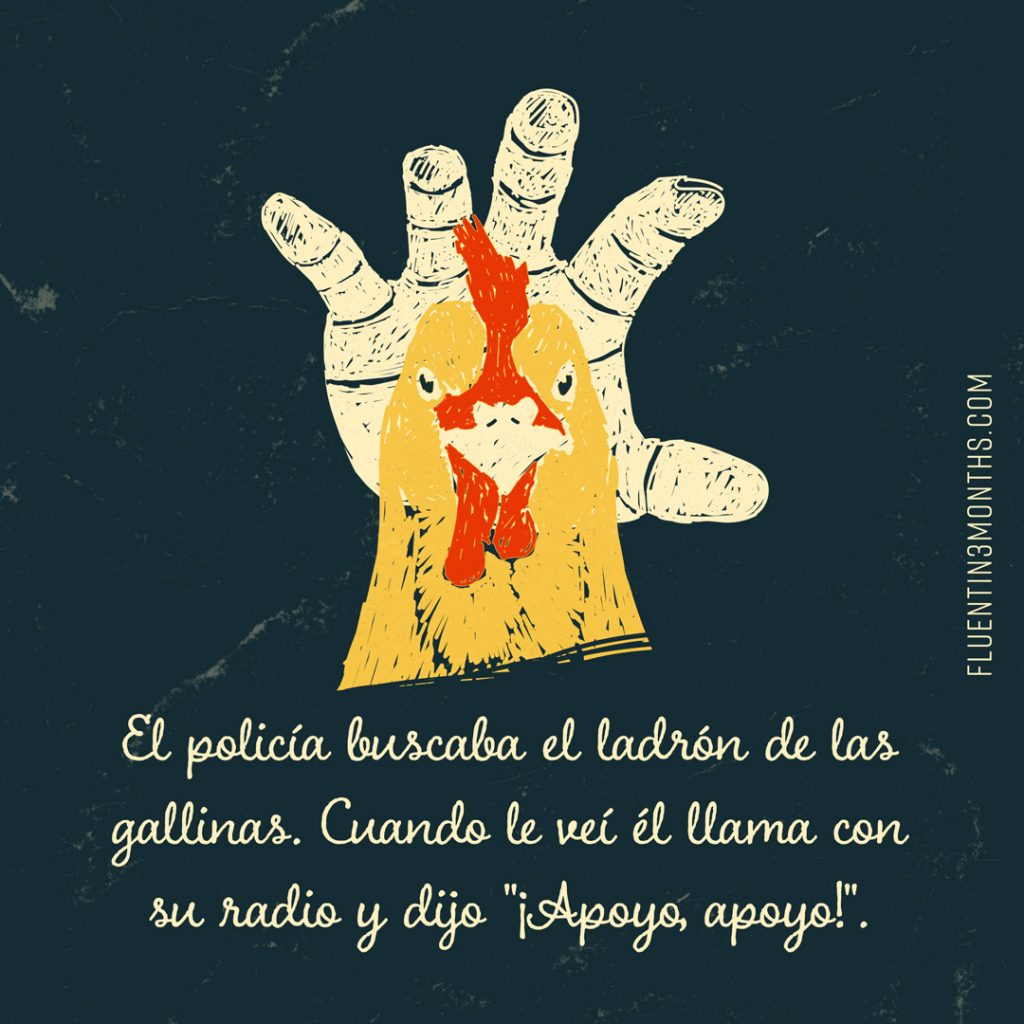
El policía buscaba el ladrón de las gallinas. Cuando le veí él llama con su radio y dijo “¡Apoyo, apoyo!”.
Translation:
The police officer was searching for the chicken thief. When he saw him, he got on his radio and said “help, help!”
This is a pun because the thief has been stealing chickens, and apoyo, “help”, sounds like pollo, “chicken”.
Is the policeman asking for help, or is he describing what he sees?
13. Where Did the Wine Come From?

¿Vino de la casa, señor? ¿Y a usted por qué le importa de dónde vengo?
Translation:
House wine, sir? Why does it matter to you where I'm from?
Oops – the waiter has asked an innocuous question, but it sounds like he's offended the guest.
This is because vino means “wine”, but it's also a form of the verb venir, “to come”. Vino de la casa means “house wine”, but it can also mean “did you come from the house?” – hence the misunderstanding.
14. What Brand of Clock?

La semana pasada me compré un reloj. ¿Qué marca? ¡La hora!
Translation:
Last week I bought myself a watch. What brand? The time!
Another misunderstanding. ¿Qué marca? could mean “what brand?” – a Rolex, maybe? – or it could mean “what does it show/tell/indicate?”, from the verb marcar.
What does the watch tell? The time, duh! What a stupid question.
15. Smelling Salts

Cual es la sal que más mal huele? La sal pargatas.
Translation:
What type of salt smells the worst? The “pargatas” salt.
“Pargatas” isn't a real word, but la sal pargatas sounds like las alpargatas.
An alpargata is a type of sandal, and I suppose it might get sweaty and stinky after being worn all day. So sal pargatas must be a foul-smelling type of salt.
Did You Enjoy These Funny Spanish Puns?
Like I said, these “jokes” aren't likely to make you fall out of your chair laughing, but I hope they've taught you a thing or two about how to speak Spanish and spice up your Spanish speech.
Were there any Spanish puns that you understood without my explanation? And do you know any other good Spanish puns or hispanic jokes – preferably ones that are funnier than the ones I've given? Let me know in the comments.

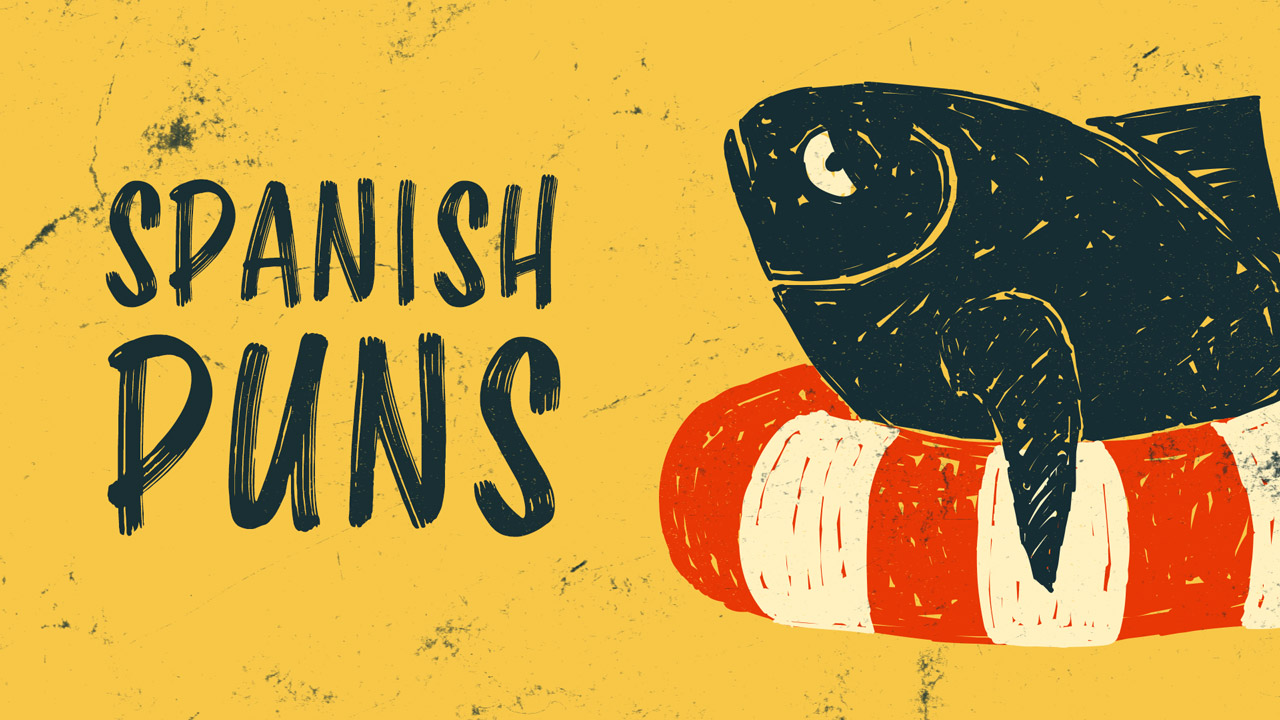


Social